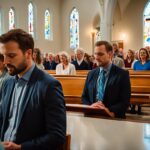Ever felt lost and needed someone to guide you? I know that feeling. There are times we all need comfort, hope, and spiritual help. That’s when a Pastor or Priest steps in to lead us through the hard times.
Pastors and Priests aren’t just leaders. They are beacons of light, showing us the way to inner peace and salvation. They are full of faith and care, holding the hopes and struggles of their people closely.
They are more than just standing at the church every Sunday. They play many parts in the church and community’s life. They lead, teach, and give uplifting talks. They are there during both sad and happy times, keeping everyone together.
No matter the name, these spiritual leaders are important to us. They help us grow our faith. They lead us to understand ourselves and our place in the world better.
Pastors and Priests are key in connecting us with God’s love. They encourage us to live by our spiritual values. And grow closer to a higher power with their guidance.
Let’s learn more about the Pastor or Priest’s role in society. We will look into their teachings and wisdom together. Join me as we see the huge effect these leaders have on our lives and the world.
Key Takeaways:
- A Pastor or Priest is a spiritual leader who offers guidance and support to their congregation.
- They play a vital role in fostering connections within the community and inspiring individuals to live a faith-filled life.
- These church leaders carry the weight of their congregation’s hopes, dreams, and struggles.
- Through their actions, they serve as ambassadors of God’s love and teachings.
- Join us as we explore the profound impact of these spiritual leaders on our lives and society.
Biblical Definition of a Pastor
In the Bible, a Pastor is a shepherd for a church. They guide and care for the people spiritually. The name comes from “pastoral” and “pasture,” showing their duty to look after the church community’s well-being.
The Bible talks about the Pastor’s role, like in Ephesians 4:11-12. It says that God gave some people, including pastors, to help everyone grow spiritually and build up the church.
A Pastor acts like a shepherd, leading and safeguarding the church. They teach God’s Word and give support and advice, aiding in everyone’s spiritual quest. This includes caring for each person’s needs and wellbeing.
“The LORD is my shepherd; I shall not want. He makes me lie down in green pastures. He leads me beside still waters. He restores my soul. He leads me in paths of righteousness for his name’s sake.” – Psalm 23:1-3
The biblical view of a Pastor sees them as leaders and spiritual caregivers. They ensure the church grows in faith and well-being. Their task is to lead and take care of the spiritual needs of the congregation.

Leading with Love and Compassion
Pastors have a special role to lead with love and compassion, following Jesus’ example. They are to show Christ-like living and provide a loving, safe space for the church.
The book of 1 Peter 5:2-3 points out key aspects of being a pastor. It guides them to care for the church, showing love and not seeking personal gain. They should be willing examples for others, not controlling but leading by example.
By their words and actions, pastors reveal God’s love. They help the church grow closer to God through their genuine actions and care for others’ spirituality.
Relevant Bible Verses about Pastors
The Bible is full of teachings about the role of pastors in leading a church. It shows us how pastors are crucial spiritual figures. They guide and support those who follow them.
Jeremiah 3:15: “And I will give you shepherds after my own heart, who will feed you with knowledge and understanding.”
Ephesians 4:11-12: “And he gave the apostles, the prophets, the evangelists, the shepherds and teachers, to equip the saints for the work of ministry, for building up the body of Christ.”
These verses talk about how pastors are special and chosen by God. They teach and guide others, helping them grow spiritually. Pastors are leaders in the church, strengthening and growing the community of faith.
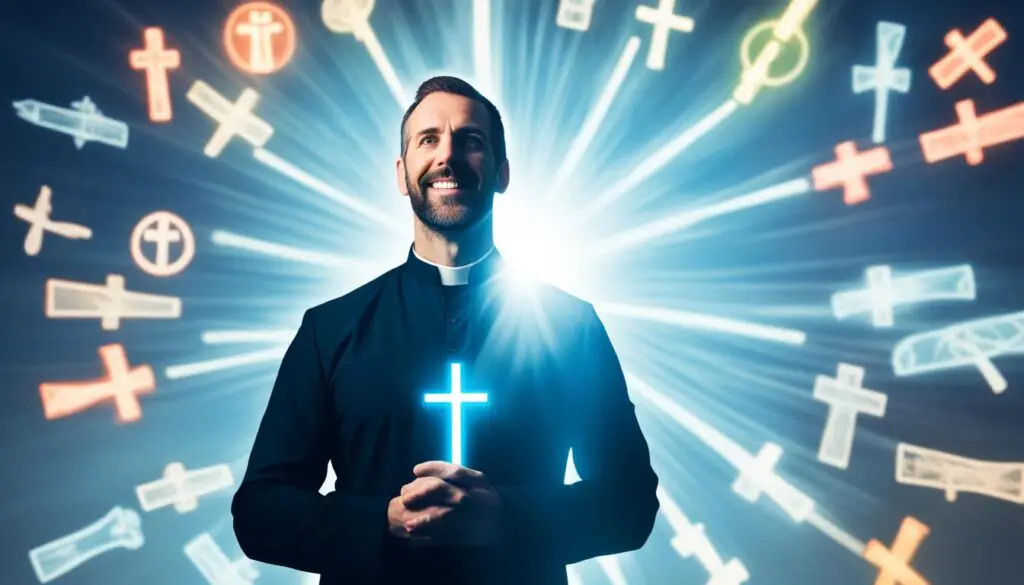
Jeremiah 3:15 Explained
“And I will give you shepherds after my own heart, who will feed you with knowledge and understanding.”
God promises shepherds that follow His heart. These pastors are picked to give the group wisdom and understanding. It shows how important they are in caring for the spiritual lives of their followers.
Ephesians 4:11-12 Explained
“And he gave the apostles, the prophets, the evangelists, the shepherds and teachers, to equip the saints for the work of ministry, for building up the body of Christ.”
This part of Ephesians talks about the different leaders in the church. Pastors, along with apostles, prophets, evangelists, and teachers, are critical. They help other church members with their spiritual work. This way, the church community grows stronger and closer together.
Examples of Pastors in the Bible
The Bible shows us people who served as pastors. These stories share the work and care pastors give. They keep inspiring and guiding leaders in the church.
Apostle Peter
The Apostle Peter stood out as a pastor. He called himself a shepherd in 1 Peter 5:2-3. Peter asked fellow elders to take care of God’s flock. He knew it’s crucial to guide and support believers, helping their faith grow.
“Shepherd the flock of God that is among you, exercising oversight, not under compulsion, but willingly, as God would have you; not for shameful gain, but eagerly; not domineering over those in your charge, but being examples to the flock.” – 1 Peter 5:2-3
Prophet Jeremiah
Jeremiah was also a shepherd, chosen by God. He guided the Israelites. His job was to lead in right living, teach about God, and warn about troubles ahead.
“And I will give you shepherds after my own heart, who will feed you with knowledge and understanding.” – Jeremiah 3:15
These examples show the big role of pastors in the Bible. Pastors were leaders who took care of God’s people. They taught us how pastors can help and guide others.

In the Bible, many faithfully served as pastors. They guided and took care of their groups. These stories show how important leadership and care are. We can learn a lot and be inspired by these pastors.
Lessons from the Role of a Pastor
The role of a Pastor teaches Christian leaders valuable lessons. It’s about more than a title. It includes deep teachings. These are key for guiding a congregation spiritually.
- Importance of Spiritual Guidance: A Pastor shows how crucial spiritual direction is. They offer guidance through preaching, teaching, and counseling. This helps people on their spiritual paths.
- Compassion for Others: Pastors teach the importance of being compassionate. They show empathy, understanding, and love. This creates a caring place for people who need comfort and support.
- Serving the Needs of the Congregation: Pastors help in many ways. They offer care, deal with practical needs, and give advice in tough times. They are there for their congregation when they are needed most.
- Close Relationship with God: Pastors remind us to stay close to God. They do this by making prayer, study, and devotion part of their lives. They set an example for others.
- Leading by Example: Pastors lead by showing how to live a good life. They are models of integrity, humility, and commitment. By following their example, people grow in faith and do what’s right.
Christian leaders are reminded of how they change lives. By offering guidance, being compassionate, and leading with service, they live out their faith. They help people grow spiritually and stay connected as a community.
| Lesson | Key Takeaway |
|---|---|
| Importance of Spiritual Guidance | Providing clear and meaningful spiritual direction to guide the congregation. |
| Compassion for Others | Demonstrating empathy, understanding, and love towards the congregation. |
| Serving the Needs of the Congregation | Addressing practical concerns and providing support in times of difficulty. |
| Close Relationship with God | Emphasizing the importance of cultivating a personal connection with God. |
| Leading by Example | Inspiring others through actions and words, embodying the virtues they teach. |
Implications of the Role of a Pastor on Personal Life
Being a Pastor changes a person’s life a lot. It demands a strong connection with the Bible, a lot of prayer, and growth in your faith. Pastors must put the congregation’s needs first. Their private life is closely tied to their duties as a spiritual leader.
“A Pastor’s life must mirror the church’s teachings,” shares Reverend Michael Collins. “People look up to the Pastor. Therefore, leading a good life sets a positive example for them.”
Pastors play a big role in taking care of their church. This means being ready to help, even if it means missing time with their own family. It involves being there for counseling, emergencies, and joining community events.
Reverend Sarah Thomas, a pastor with more than 20 years of experience, says, “Finding balance between personal time and ministry is key. Setting limits and taking care of ourselves are crucial to avoid getting too tired.”
Moreover, being a Pastor means always growing spiritually. Pastors strive to learn more about the Bible and follow spiritual practices. This growth helps keep their faith strong and lets them help others better.
Challenges and Rewards of the Pastoral Role
The life of a Pastor can be hard, but it is hugely rewarding. The work is demanding and can make Pastors feel tired. But, they get to make a real difference in people’s lives and see their faith grow.
“Being a Pastor is rewarding beyond words,” says Pastor Jonathan Rodriguez. “Seeing faith and hope bloom in people makes every hard moment count.”
Though challenging, being a Pastor is satisfying. It motivates them to keep going with a strong purpose. The joy of leading spiritually makes it all worthwhile.

| Challenges | Rewards |
|---|---|
| Emotional and physical fatigue due to demanding pastoral work | Impact on lives, providing guidance, and witnessing spiritual transformations |
| Sacrifices in personal schedules and family time | Opportunity to lead by example and inspire others |
| Continuous dedication to spiritual growth | Deepening personal faith and equipping for effective ministry |
Implications of the Role of a Pastor for Society
A Pastor does more than lead church services. They affect society deeply. Pastors help build strong moral values. They support families and give advice. They also connect with the local community.
A Pastor’s main job is to talk about being good. They inspire people to live honest and kind lives. Their work makes people care about others. This changes how people act in their community.
Pastors are there to support anyone in need. They listen and give comfort. They also help with spiritual advice. This support is vital for many, helping them face life’s challenges.
“The Pastor’s role in society is huge. They build moral values and help families. This is key for a healthy community.”
Pastors help bring the community together. They organize events that connect people. These activities make everyone feel they belong. This makes the community strong and friendly.
They also help people think about their faith. Their words encourage spiritual growth. This makes society as a whole more spiritual. It leads to a shared sense of purpose and hope.
Key Implications:
- Promoting moral values
- Providing support and guidance
- Fostering community connections
- Contributing to spiritual growth
Pastors have a big impact on society. They help shape values and community life. Their work is essential for a caring and spiritually rich society.
Differences Between a Pastor and a Priest
While the terms “pastor” and “priest” are often mixed up, they mean different things in various faiths.
Pastor:
A pastor leads in Protestant or non-denominational churches. They help people connect spiritually and grow together.
They lead worship and talk about faith. But, they also counsel and support their church family. They build community links and push for spiritual development.
Priest:
The title “priest” is common in Catholic, Greek Orthodox, and Anglican religions. They do rituals and sacraments, acting as bridges between God and believers.
Catholic priests lead sacraments, listen to confessions, and do the Eucharist. They are clergy with the task of guiding spiritually and helping their community.
Pastors and priests do lead in their communities. Yet, their duties differ because of their religious beliefs.
| Pastor | Priest |
|---|---|
| Associated with Protestant or non-denominational churches | Commonly used in Catholic, Greek Orthodox, and Anglican traditions |
| Primarily focuses on spiritual guidance and community building | Performs sacraments and rituals, serving as mediators between God and the faithful |
| Provides counseling and support to parishioners | Administers sacraments, hears confessions, and performs the Eucharist |
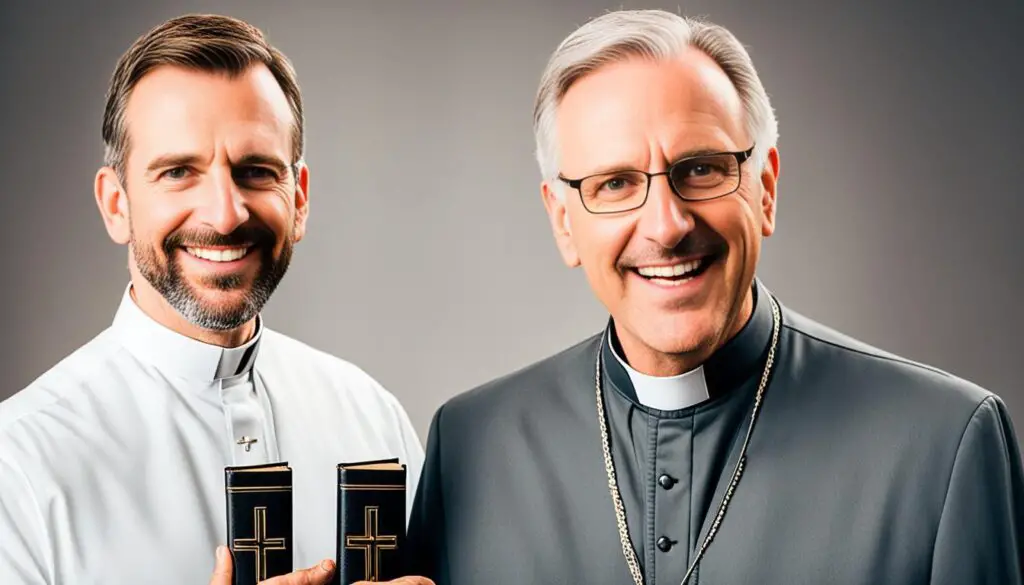
The image above shows how pastors and priests are different. It tells about their unique roles, traditions, and what they are responsible for.
Educational Requirements for Pastors
Educational needs for pastors can change based on their Christian denomination. Yet, most traditional and mainline Protestant churches have clear steps for pastor education.
These pastors usually must go through seminary. This is special training that covers theology, Bible studies, and how to minister. It helps them lead a church well, support their churchgoers spiritually, and take care of their needs.
Being ordained is also key in these churches. This means a pastor goes through tests on their beliefs and lifestyle, and proves they are ready to lead. It’s a big step in recognizing someone as a suitable shepherd for their flock.
In smaller or non-denominational Protestant groups, rules might be less strict. They too like to see pastors with seminary education but might also appreciate real-world experience and a passion for ministry. Going to a Bible college and getting a degree in theology or pastoral studies is a good idea for those looking to lead in these churches.
Example Educational Requirements for Pastors:
| Denomination | Educational Requirements |
|---|---|
| Mainline Protestant | Seminary training + Ordination process |
| Smaller Protestant/non-denominational | Bible college degree or equivalent + Practical ministry experience |
At the end of the day, the aim of all these education rules is to prepare pastors well. They should be ready to share God’s message, lead their churches, and be there for their people.
Training and Education to Become a Priest
Becoming a priest is a hardworking journey. It includes making a big decision and learning a lot. The things you need to learn can change depending on your church’s rules.
If you want to be a priest in the Catholic Church, going to a seminary is a big step. At seminaries, you get to study God’s word, learn how to help people, and understand how to lead a church.
The process of thinking about priesthood is called discernment. It involves talking with family, mentors, and church leaders. This helps you understand if priesthood is really your life path.
Catholic priests stay single, but not all priests do. For example, Greek Orthodox priests can get married before becoming priests. Anglican priests also have different rules about marriage.
Training and Education for Catholic Priests
Wanting to be a Catholic priest means you will study a lot. Let’s look at what’s needed:
- The start is when you think about being a priest. You talk with those close to you and church leaders for guidance.
- After you decide to become a priest, you go to seminary. There you learn about God, how to serve the church, and other important priestly skills.
- At seminary, you also get to practice what you’ve learned. This includes helping in parishes and doing internships to get real experience.
- Finally, after finishing seminary and meeting all requirements, you can become a priest through a special ceremony.
What you learn at seminary is key to being a good priest. It prepares you to help your church community in many important ways. By teaching you about God, how to care for people, and how to lead, seminaries help you get ready for priesthood.
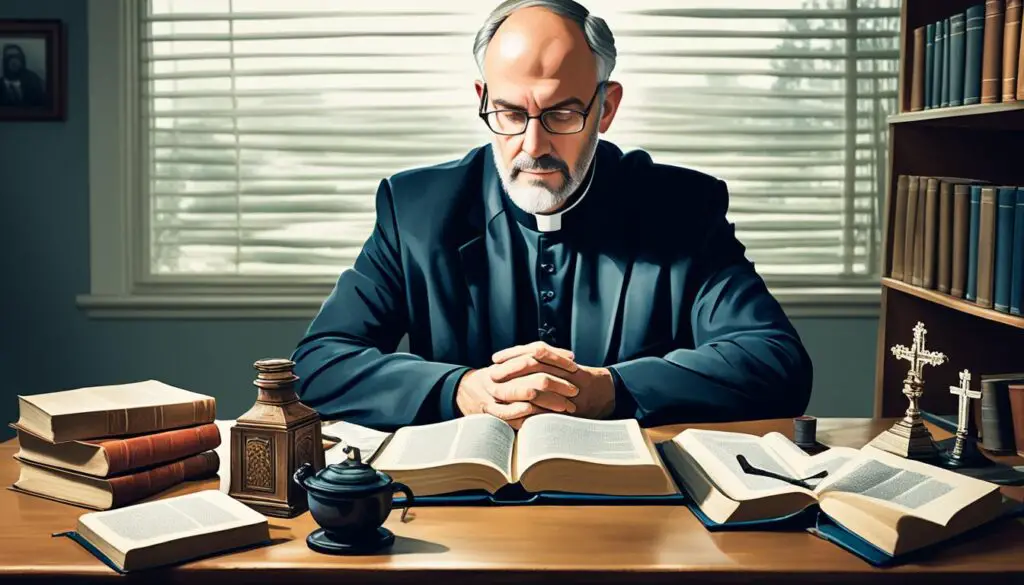
| Denomination | Training and Education Requirements |
|---|---|
| Catholic Church | – Seminary education – Discernment process – Celibacy requirement |
| Greek Orthodox Church | – Seminary education – Discernment process – Marriage allowed before ordination |
| Anglican Church | – Seminary education – Discernment process – Guidelines for priestly marriage vary within branches |
Distinctions in Attire Between Pastors and Priests
Pastors and priests dress differently because of their roles and traditions. Pastors in Protestant churches can wear a variety of outfits. But, priests in Catholic, Greek Orthodox, and Anglican churches wear special clothes with meanings.
Pastors in Protestant churches like to keep their clothes comfortable and casual. They choose what to wear based on the rules of their church or what they like. This choice lets them focus on leading their church members easily.
In contrast, priests from the Catholic, Greek Orthodox, and Anglican churches wear special clothes with deep meanings. These clothes, called vestments, show the long history and spiritual beliefs of their church. They have worn these vestments for centuries.
“The attire of a priest in the Catholic Church, for example, includes garments such as the alb, stole, chasuble, and cassock. Each of these vestments holds symbolic meaning and is worn during specific religious services or sacraments,” explains Father David Johnson, a Catholic priest.
The colors of a priest’s vestments also mean something special. The color white stands for purity and is used during happy times. But, purple shows sorrow and is worn during repentance.
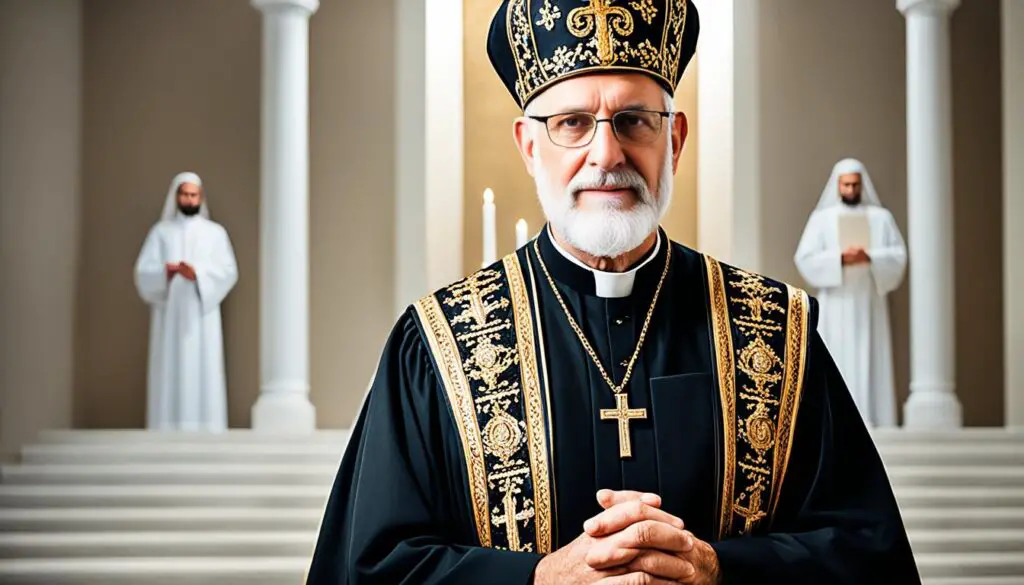
Distinctions in Hierarchical Epicenters
There’s a big difference in how leaders are organized in churches. Protestant ones, like Baptist, Methodist, or Presbyterian, work without a single, big group in charge. Each church has its own way of doing things. In contrast, Catholic and some other churches have a clear leader in the Vatican at the top. They all follow one set of rules under the Pope.

Protestant churches stand alone, with their own leaders for each area, like a city or country. But, in Catholic and alike churches, everyone follows the Pope, who leads from the Vatican. The Pope guides many other leaders, like bishops, so that rules stay the same everywhere.
The way leadership is set up is very different in pastors and priests. In Protestant churches, each one is on their own. But in Catholic and similar ones, the Vatican helps to keep things in order.
In Protestant churches, pastors have a lot of freedom because there isn’t someone above them all. They do team up with other pastors to work on things together. This lets them help their local groups in special ways.
Catholic priests are part of a bigger team that has someone always leading. They’re told what to do by their bosses, like bishops, who follow the Vatican’s directions. This way, all churches work the same, no matter where they are.
How churches are led, whether Protestant or Catholic, shows a big difference. They both work to lead and help their groups, but in different ways. This makes each kind of church special.
Similarities and Differences between Chaplain, Minister, Pastor, and Priest Roles
Chaplains, ministers, pastors, and priests help their communities in different ways. They share in giving spiritual advice and leading religious events. But, they also stand apart because of special roles or the types of religions they serve.
Chaplain:
A chaplain works in places like hospitals, the military, and schools. They guide people spiritually in these places. Chaplains help those from many faiths, offering advice and leading religious activities.
Minister:
Ministers are ordained to serve in religious ways. They can be found in various Christian groups. This includes Baptists, Methodists, and more. They lead groups, speak at gatherings, and handle important ceremonies. Ministers offer care and advice to their people.
Pastor:
A pastor is a kind of minister who leads a church. They focus on caring for their members and offering advice. Pastors teach, guide at events, and look after the church’s duties.
Priest:
Priests serve mainly in churches with set rituals. This includes the Catholic and Greek Orthodox churches. They oversee important sacred events. Priests act as a bridge between their followers and God. They offer advice, lead in worship, and care for their communities.
“While chaplains, ministers, pastors, and priests share the common goal of providing spiritual support to individuals and communities, their roles vary based on their specific appointments and denominational traditions. Each plays a crucial part in the spiritual well-being of those they serve.”
| Religious Leader | Role | Typical Settings |
|---|---|---|
| Chaplain | Spiritual support and guidance | Hospitals, military organizations, correctional facilities, universities |
| Minister | Leading congregations, delivering sermons, officiating ceremonies | Protestant, Baptist, Methodist churches |
| Pastor | Shepherding congregations, providing spiritual guidance | Churches, religious communities |
| Priest | Administering sacraments, leading religious rituals | Catholic, Greek Orthodox, Anglican churches |
Even with their unique jobs, chaplains, ministers, pastors, and priests are crucial. They are guides, bring comfort, and serve their communities with faith and care.
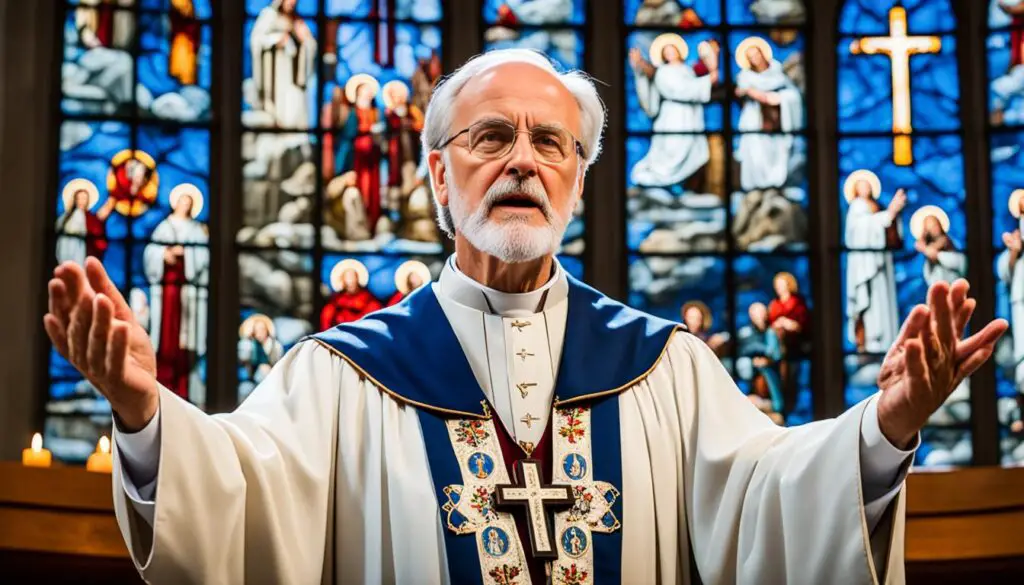
Function of the Priest as Leader of the Parish Community
A priest plays a key role in leading the parish community. They guide and mentor, offering spiritual help to all. Beyond ceremonies, a priest cares for the community’s well-being.
The priest is like a shepherd, caring for the community’s spiritual growth. They provide advice and comfort, helping in both hard times and celebrations. The priest’s teachings aim to strengthen the community’s spiritual bond with God.
Celebrating sacraments is deeply important for a priest. They oversee events like baptisms, weddings, and funerals, supporting the faithful through life’s key moments. In doing so, the priest helps the community feel God’s grace and love.
Another key task is to share God’s teachings. Through sermons, homilies, and lessons, priests offer wisdom for daily faith. Their messages can profoundly influence the community’s beliefs and actions.
The Role of the Priest as a Leader:
“The priest is like a shepherd who leads and guides the flock, ensuring that no one is left behind. They foster a sense of belonging and community within the parish, encouraging active participation and collaboration.”
Priests are also connectors between the community and the world. They urge for justice, compassion, and mercy. They motivate the faithful to turn their beliefs into actions to better the world.
Responsibilities of a Priest as the Leader of the Parish:
- Shepherding the community
- Celebrating the sacraments
- Proclaiming the Word of God
- Providing guidance and counsel
- Building a sense of belonging
- Promoting justice and compassion
A priest’s presence and work greatly support the community’s spiritual health. They model faith, love, and service, inspiring others. Priests are essential in nurturing a strong, united parish through their devotion.
| Priest | Leader | Parish Community | |
|---|---|---|---|
| Shepherd | ✓ | ✓ | |
| Celebrates sacraments | ✓ | ✓ | |
| Proclaims the Word of God | ✓ | ||
| Provides guidance | ✓ | ||
| Builds community | ✓ | ✓ | |
| Promotes justice and compassion | ✓ |
Conclusion
The role of a pastor or priest in a church community is vital. They guide, support, and inspire the congregation. Their work helps people grow their faith and find life’s meaning. They especially care about the spiritual life of the church and help everyone feel connected.
Pastors and priests have their unique roles in Christianity. Pastors lead in Protestant churches. Their duties include taking care of the church, preaching, and offering support. Priests, seen in Catholic and other traditions, do different tasks. They perform sacraments, lead worship, and connect people with God.
Although their roles differ, both are crucial in helping the faithful. They guide in happy and hard times, help in spiritual growth, and inspire their communities. Being a pastor or a priest is a high calling. It is about serving God and guiding others in their spiritual path.





